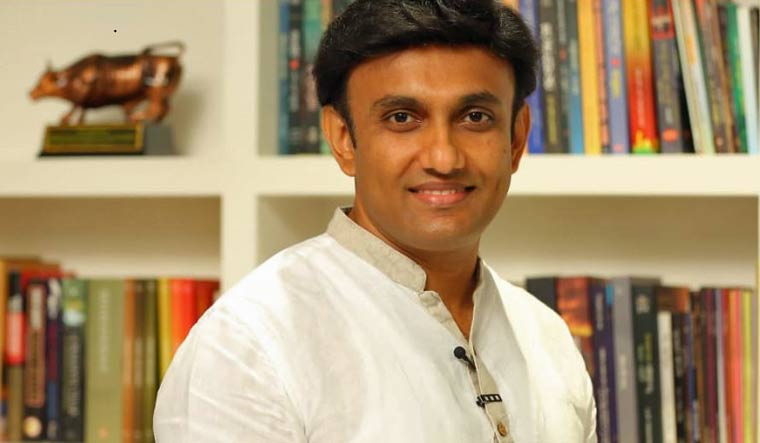Dr K. Sudhakar was quite young when the plague and SARS outbreaks happened. Now, the 46-year old medically qualified doctor has experience on his side to deal with infectious diseases. “COVID-19 is more contagious than SARS. However, in terms of mortality, SARS was more dangerous,” he says. Italy’s coronavirus death toll makes him uneasy. “They have a large population of elderly and initially, they didn’t take the outbreak seriously. If they had taken precautionary measures the way we do, many lives could have been saved,” the medical education minister of Karnataka tells THE WEEK in an interview. “Time and again, the viruses and microbes are challenging our fraternity of scientists and doctors,” the legislator from Chikkaballapur says. A perennial optimist, Sudhakar hopes that the cure for COVID-19 is not far away.
Excerpts from the interview:
The way Karnataka’s Health and Family Welfare Department has handled the COVID-19 crisis is commendable. It seems your strategy of being proactive really worked.
Thank you. The government, the chief minister (B.S. Yediyurappa) and the health minister (B. Sriramulu), extend me their full support.
We took all these precautionary measures initially itself. We understood what was coming in. We foresaw it and prepared ourselves to combat the outbreak. The hard work has really paid off—even after so many days the graph is not spiking.
That said, the next three weeks could be challenging.
How is the situation in Karnataka now?
So far, 15 positive cases have been reported in Karnataka. As a doctor and minister, I feel sad. I feel bad for the patients. I am concerned about their well-being. We make sure they are well-treated. At the same time, we take measures to ensure that quarantine is followed strictly.
The government has been fighting a relentless battle against COVID-19. A cabinet sub-committee has been formed as a task force. Everyday we meet at 1:30pm and analyse the situation. We discuss what measures are to be taken to combat the disease and monitor how quarantine is happening.
We have categorised travelers into three categories depending on their age and vulnerability. People falling into the A and B categories are quarantined. The rest are home-quarantined.
Measures are also being taken to disinfect hospitals and public places. We will also be engaging house surgeons of all government and private medical colleges for one month.
Some of the COVID-19 patients in the state have recovered. They may go home, but we are just putting them into another 14 days of quarantine just to be on the safe side.
We have availed the services of mental health experts to offer to counsel people with COVID-19 and those under quarantine. We have a tie-up with NIMHANS for this.
What kind of challenges do you foresee in the next three-four weeks?
Now that all international flights to India have been banned, 50 per cent of our burden has been reduced. Most of the patients who tested positive for COVID-19 are those with a recent travel history to overseas. And the rest of the positive cases had close contact with them. That said, the battle is not yet over. We need to ensure those who have been tested positive are quarantined to contain the spread of the virus.
The international protocol is changing. This is a new virus. Some experts believe the patient should be quarantined for 35 days. We don’t know whether COVID-19 patients need to be quarantined for a longer duration. No one knows for certain what the exact protocol for quarantine should be. We insist those tested positive be quarantined for 28 days.
What are the chances of community transmission happening in the state?
According to the Indian Council of Medical Research, India is currently in stage-2 of the disease where people with a travel history and those in contact with them have been infected.
In stage-3 it could spread in the community and in stage-4, the transmission happens across the country. Yes, there is a possibility of community transmission if we don’t take enough precautions. It is a droplet infection that spreads through handshake and close contact. Maintain at least a three-foot distance with others. Social distancing is a must.
There are only a limited number of COVID-19 testing labs in the state.
No. Of the 52 testing labs in the country, five are in Karnataka and three more are getting ready. That way, Karnataka is ahead of other Indian states.
I have requested the Union Health Minister (Harshavardhan) and ICMR Chairman to permit private labs to conduct tests for COVID-19. Hundred labs for one million people—that’s the target I have kept for testing.
What’s your message to people?
If you have a cold and cough and a history of international travel, you need to be careful. Go to the nearest government hospital or call 104, the 24x7 helpline number. Our volunteers and experts will give you guidance. If required, they’ll ask you to get a test done. We have such facilities at Rajiv Gandhi Institute of Chest Diseases, Bangalore Medical College and Research Institute and NIMHANS. Similarly, in the district headquarters, we have our own hospitals. Wherever there is a government medical college, one can go. We have set up dedicated help desks in these medical colleges to ensure quick and easy access to information.
People should cooperate. If someone has travelled from one of those countries that have been seriously affected, people living in the community should maintain distance.
All those who have a recent history of international travel should adhere to strict quarantine. They should not take it lightly. There are chances of transmitting the infection. So they should not hang out in public places.
Let’s fight COVID-19 together, without being physically together.



